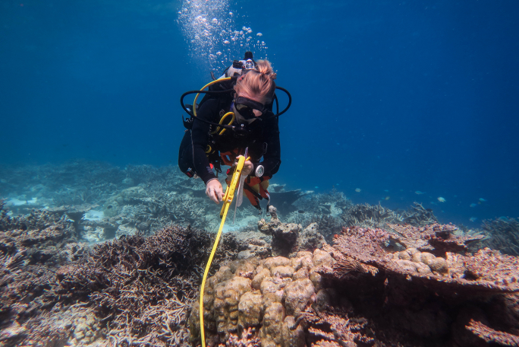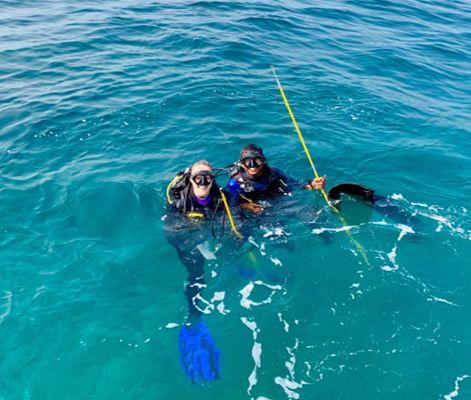Dr. Tina Skinner
I am a coral reef ecologist with a range of interests at both the community and individual level. I am particularly interested in connectivity, both energetic and organismal, and in understanding the direct and indirect relationships that structure reef communities. I like to draw on my diverse skill set to answer these questions – whether that’s setting baited cameras to determine shark and fish habitat use, running stable isotope analysis on tissue samples to estimate organism dietary contributions, or using models to identify the drivers of reef populations. I also strongly believe that for research to be most effective, it should be communicated to diverse audiences. I enjoy talking to classrooms locally, but also online to engage with the next generation about marine science.
My current research involves using ecological models to simulate the effects of different control intervention strategies on Crown of Thorns Starfish (COTS) outbreaks on the Great Barrier Reef. This project is part of the wider COTS Control Innovation Program, a collaborative research partnership between the Great Barrier Reef Foundation and leading institutions with COTS expertise (UQ, AIMS, CSIRO, JCU). These findings will directly contribute to improved management of these outbreaks on the GBR.
Career:
2022 – Present: Postdoctoral Research Fellow, University of Queensland, Australia
2020 – 2022: Postdoctoral Research Fellow & Laboratory Manager, Hong Kong University of Science and Technology, Hong Kong
2015 – 2016: Researcher, Newcastle University, UK & Haribon Foundation, Philippines
2014: Researcher, CARMABI, Curaçao & ZMT, Bremen, Germany
2013 – 2014: CNRS Research Assistant, CRIOBE, Mo’orea, French Polynesia
2012 – 2014: Research Assistant, and Visiting Scientist, Newcastle University, UK
Education:
2016 – 2020: PhD Marine Biology, Newcastle University, UK
Elucidating coral reef predator trophodynamics across an oceanic atoll
2011 – 2012: MSc Tropical Coastal Management, Newcastle University, UK
Chronic spearfishing may indirectly affect reef health through reductions in parrotfish bite rates
2008 – 2011: BSc Marine Biology (Honours), Newcastle University, UK
Anthropogenic impacts on coral reef communities in Jepara, Indonesia
Publications:
Skinner C, Cobain MRD, Zhu Y, Wyatt ASJ, Polunin NVC. (2022) Progress and direction in the use of stable isotopes to understand complex coral reef ecosystems: a review. Oceanography and Marine Biology: An Annual Review. In press.
Skinner C, Pei Y-D, Morimoto N, Miyajima T, Wyatt ASJ. Stable isotopes elucidate body-size and seasonal fluctuations in the feeding strategies of planktivorous fishes across a semi-enclosed tropical embayment. Frontiers in Ecology and Evolution http://doi.org/10.3389/fevo.2022.942968
Cybulski JD and Skinner C, Wan Z, Wong CKM, Toonen RJ, Gaither MR, Soong K, Wyatt ASJ, Baker DM. Improving stable isotope assessments of inter- and intra-species variation in coral reef fish trophic strategies. Ecology and Evolution http://doi.org/10.1002/ece3.9221
Bennett-Williams J, Skinner C, Wyatt ASJ, McGill RAR, Willis T. (2022) A multi-tissue, multi-species assessment of lipid and urea stable isotope biases in mesopredator elasmobranchs. Frontiers in Marine Science http://doi.org/10.3389/fmars.2022.821478
Skinner C, Mill AC, Fox MD, Newman SP, Zhu M, Kuhl A, Polunin NVC (2021) Offshore pelagic subsides dominate carbon inputs to coral reef predators. Science Advances http://doi.org/10.1126/sciadv.abf3792
Skinner C, Mill AC, Newman SP, Alsagoff SN, Polunin NVC (2020) The importance of oceanic atoll lagoons for coral reef predators. Marine Biology https://doi.org/10.1007/s00227-019-3634-x
Skinner C, Mill AC, Newman SP, Newton J, Cobain MRD, Polunin NVC (2019) Novel tri-isotope ellipsoid approach reveals dietary variation of sympatric predators. Ecology and Evolution http://doi.org/10.1002/ece3.5779
Skinner C, Newman SP, Mill AC, Newton J, Polunin NVC (2019) Prevalence of pelagic dependence among coral reef predators across an atoll seascape. Journal of Animal Ecology http://doi.org/10.1111/1365-2656.13056
Skinner C, Newman SP, Box S, Narozanski A, Polunin NVC (2019) Chronic spearfishing may indirectly affect reef health through reductions in parrotfish bite rates. Journal of Fish Biology http://doi.org/10.1111/jfb.13939
Jorissen H, Skinner C, Osinga R, de Beer D, Nugues MM (2016) Evidence for water-mediated mechanisms in coral–algal interactions. Proceedings of the Royal Society B http://doi.org/10.1098/rspb.2016.1137




